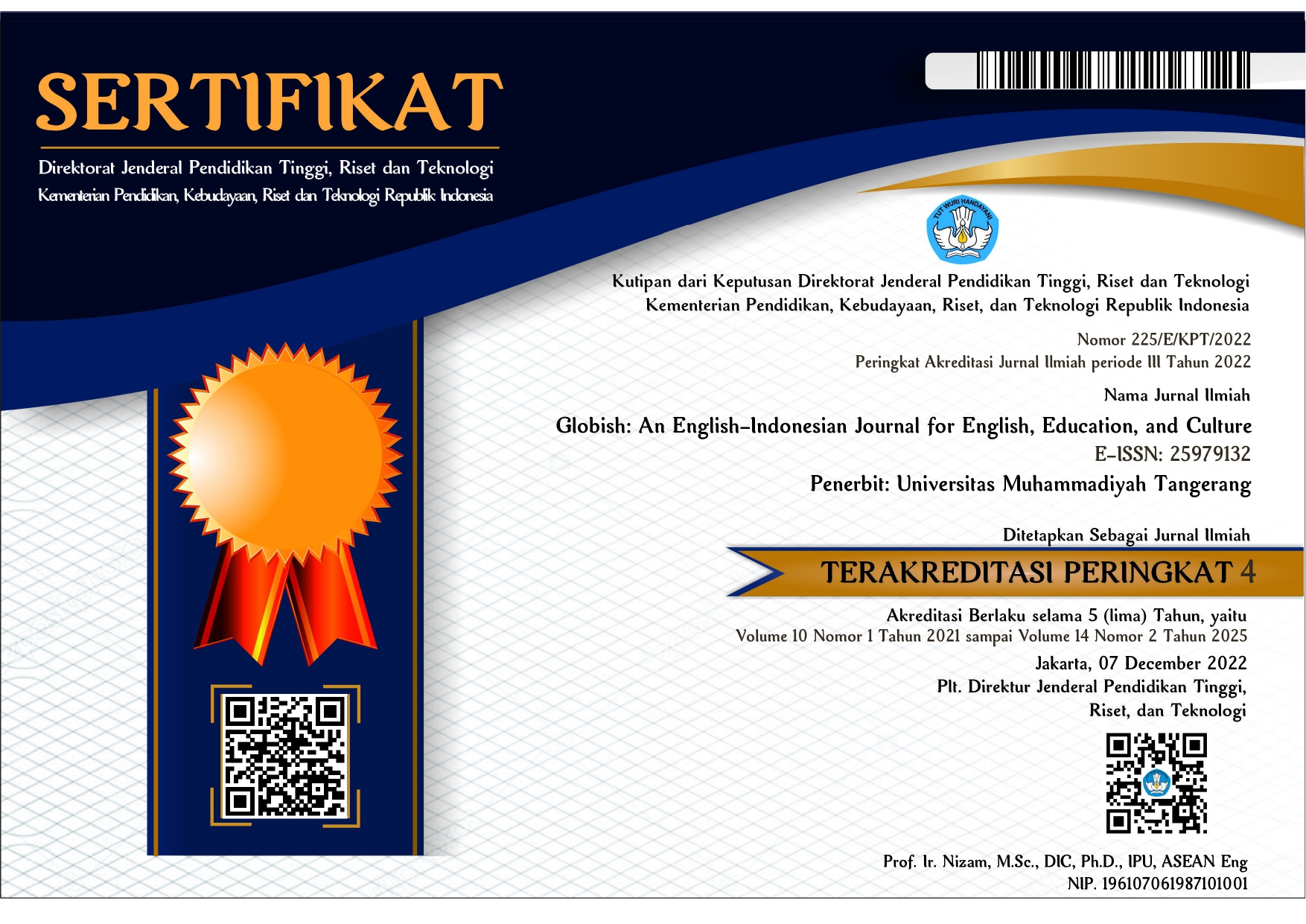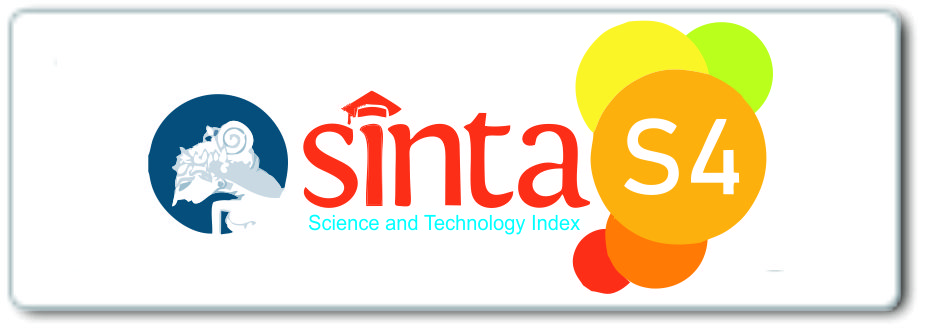The Needs of Assistive Technology on Students’ EFL Writing
Abstract
Nowadays generally, technology encompasses all aspects of modern life and particularly, the writing by using English language. The challenges of learning English writing in Indonesia are plenty as English is perceived as a Foreign Language. This paper aims to reveal tertiary level students’ perception and attitude towards their technology aptitude: usage models, noticed benefits of and challenges to employ technology in learning English as Foreign Language (EFL) writing. This is a qualitative research, a case study, and used a self-structured questionnaire and interview to collect the data. Two participant lecturer observers and one hundred and sixty-seven students in a private college in Tangerang were purposively selected thirty students for questionnaire and interview. The data were carried out to reveal the lecturers and students’ perspective of assistive technology in EFL writing. The results revealed that assistive technology such as Webbing/Blogs, Computer software, Social Mediaapps, YouTubechannel, smart phone and tablet apps are found to be used by EFL learners to learn EFL Writing. Yet, most of the students had constraint at bad Internet connection. The outcome of this study offers thinkable instructional suggestions for students’ EFL Writing and creates base for further studies in this area.
Keywords: Students’ EFL Writing, Learning EFL Writing, Assistive Technology
Full Text:
PDFReferences
Abdallah, Mahmoud M. S. (2011). Teaching English as a Foreign Language from a New Literacy Perspective. Assiut University College of Education, Egypt.
Agullo, G. L., Juan, H. S., & Vallejo, N. M. (2015). Mobile Learning in the Foreign Language Classroom. Filología y Didáctica de la Lengua, 15 / 2015 / 79-103.
Al Seyabi, Fawzia and Tuzlukova, Victoria. (2014). Writing Problems and Strategies: An Investigative Study in the Omani School and University Context. Asian Journal of Social Sciences & Humanities Vol. 3 (4) November 2014.
Al-Gharabally, M. (2015). The Writing Difficulties Faced by L2 Learners and How to Minimize Them. International Journal of English Language and Linguistics Research, Vol.3, No.5, pp.42-49.
Al-Mahrooqi, R., & Troud, S. (2014). Using Technology in Foreign, in Language Teaching. Cambridge Scholars Publishing.
Alqahtani, M. (2015). The importance of vocabulary in language learning and how to be taught. International Journal of Teaching and Education, Vol. III (3), pp. 21-34. 10.20472/TE.2015.3.3.002.
Alsulami, S. (2016). The Effects of Technology on Learning English as a Foreign Language Among Female EFL Students at Effatt College: An Exploratory Study. Canadian Academy of Oriental and Occidental Culture. Vol. 12, No. 4, 2016, pp. 1-16.
Aragón Jiménez, C. E., Baires Mira, D. C., & Rodriguez, G. S. (2013). An Analysis of the Writing Skill Difficulties of the English Composition I Students at The Foreign Language Department of the University of El Salvador. Main Campus, October 21st 2013, San Salvador, El Salvador.
Belkhir, A., and Benyelles, R. (2017). Identifying EFL Learners Essay Writing Difficulties and Sources: A Move towards Solution The Case of Second Year EFL Learners at Tlemcen University. International Journal of Learning, Teaching and Educational Research Vol. 16, No. 6, pp. 80-88, June 2017.
Chokwe, J. M. (2013). Factors Impacting Academic Writing Skills of English Second Language Students. Mediterranean Journal of Social Sciences MCSER Publishing, Rome-Italy Vol. 4 No 1 November.
Clements, D. H., & Sarama, J. (2003). Strip mining for gold; research and policy in educational technology-a response to fool’s gold. Educational Technology Review, 11(1), 7-69.
Cresswell, J. W. (2009). Research Design: Qualitative, Quantitative, and Mixed Methods Approaches. (3rd ed.). Thousand Oaks, CA: SAGE.
Crook, et.al. 2008. Implementing Web 2.0 in Secondary Schools: Impacts, Barriers and Issues. @Becta: leading next generation learning (September 2008).
Darmi, R., & Albion, P. (2014). A Review of Integrating Mobile Phones for Language Learning. 110th International Conference Mobile Learning.
Engstrom, E. U. (2005). Reading, writing, and assistive technology: An integrated developmental curriculum for college students. International Reading Association (pp. 30–39) doi: 10.1598/JAAL.49.1.4.
Fang, L. 2010. Using Multimedia to Motivate EFL Students’ Interest in EnglishLanguage Learning. Paper Presented in a Seminar Paper Research in University of Wisconsin-Platteville. Apr 14, 2010.
Gençlter, B. (2015). How does technology affect language learning process at an early age? Procedia - Social and Behavioral Sciences, 199(2015), 311 – 316. doi: 10.1016/j.sbspro.2015.07.552.
Harmer, J. (2007). The practice of English language teaching. England: Pearson. Hartoyo, M.A., Ph.D. 2006. Individual differences in computer assisted language learning (CALL). Semarang: Pelita Insani Semarang Press.
Hartoyo, M.A., Ph.D. 2012. ICT (Information and Communication Technology) in Language Learning. Semarang: Pelita Insani Semarang Press.
Ishihara, N., & Cohen, A. D. (2014). Teaching and learning pragmatics: Where language and culture meet. New York: Routledge.
Jong, Y. O., & Jung, C. K. (2015). The Development of Interview Techniques in Language Studies: Facilitating the Researchers’ Views on Interactive Encounters. English Language Teaching. (h. 30-39). Toronto: Canadian Center of Science and Education.
Kelly, Curtis. (2013). Teaching EFL Writing in Accordance with Stages of Learner Development. Kansai University Review of Business and Commerce, No. 14 (March 2013) pp. 31-42.
Lie, A. (2007). Education policy and EFL curriculum in Indonesia: Between the commitment to competence and the quest for higher scores. TEFLIN Journal, 18(1), 1–14.
Lim, C.P. & Oakley, G., (2013). Information and Communication Technology (ICT) in Primary Education: Opportunities and Supporting Conditions. In: Tay, L. Y. and Lim, C.P. (Eds.), Creating Holistic Technology-Enhanced Learning Experiences. Singapore: Sense Publishers.
Marzban, Amir. 2008. Using CALL in EFL Reading Comprehension Classes: English Language Teaching Conference. Azad University Ghaemshahr, Iran. Rodehen Branch.
Ravichandran, T., M.A., M. Phil., P.G.C.T.E., (Ph.D.) 2000. CALL in the Perspective of Interactive Approach: Advantages and Apprehensions. Proceedings: National Seminar on CALL, Anna University, Chennai, 10-12 February 2000, pp. 82-89. pp. 1-2.
Renandya, Willy A. and Richards, Jack C. 2002. Methodology in Language Teaching: An Anthology of Current Practice. Cambridge: Cambridge University Press.
Rimbar, H., A. 2017. The Influence Of Spell-Checkers On Students’ Ability To Generate Repairs Of Spelling Errors. Journal of Nusantara Studies 2017, Vol 2(1) 1-12. Universiti Sultan Zainal Abidin. ISSN 0127-9386 (Online).
Solagha, O. Z. (2013). Writing Difficulties in the Swedish ESL-Classroom: How teachers of English deal with Students’ writing Difficulties. Dept. of Language Education, Stockholms University.
Warschauer, M., & Ware, M. (2008). Learning, change, and power: Competing discourses of technology and literacy. In J. Coiro, M., Knobel, C. Lankshear, & D. J. Leu (Eds.) Handbook of research on new literacies (pp. 215-240) . New York: Lawrence Erlbaum Associates.
Yuan, L. (2013). Student-centered Approach and Communicative Language Learning in the Exam-oriented EFL Settings. Guangxi University, China.
Zeng, S. 2018. English Learning in the Digital Age: Agency, Technology and Context. DOI: 10.1007/978-981-13-2499-4 ISBN: 978-981-13-2498-7 (January 2018) p. 28.
DOI: http://dx.doi.org/10.31000/globish.v8i2.1758
Article Metrics
Abstract - 1964 PDF - 634Refbacks
- There are currently no refbacks.
Globish
Program Studi Pendidikan Bahasa Inggris
Fakultas Keguruan dan Ilmu Pendidikan
Universitas Muhammadiyah Tangerang
Jl. Perintis Kemerdekaan I/33, Cikokol
Kota Tangerang, Indonesia
e-mail: globish_journal@umt.ac.id
Globish (p-ISSN: 2301-9913 | e-ISSN: 2301-9913) is licensed under a Creative Commons Attribution-ShareAlike 4.0 International License.









